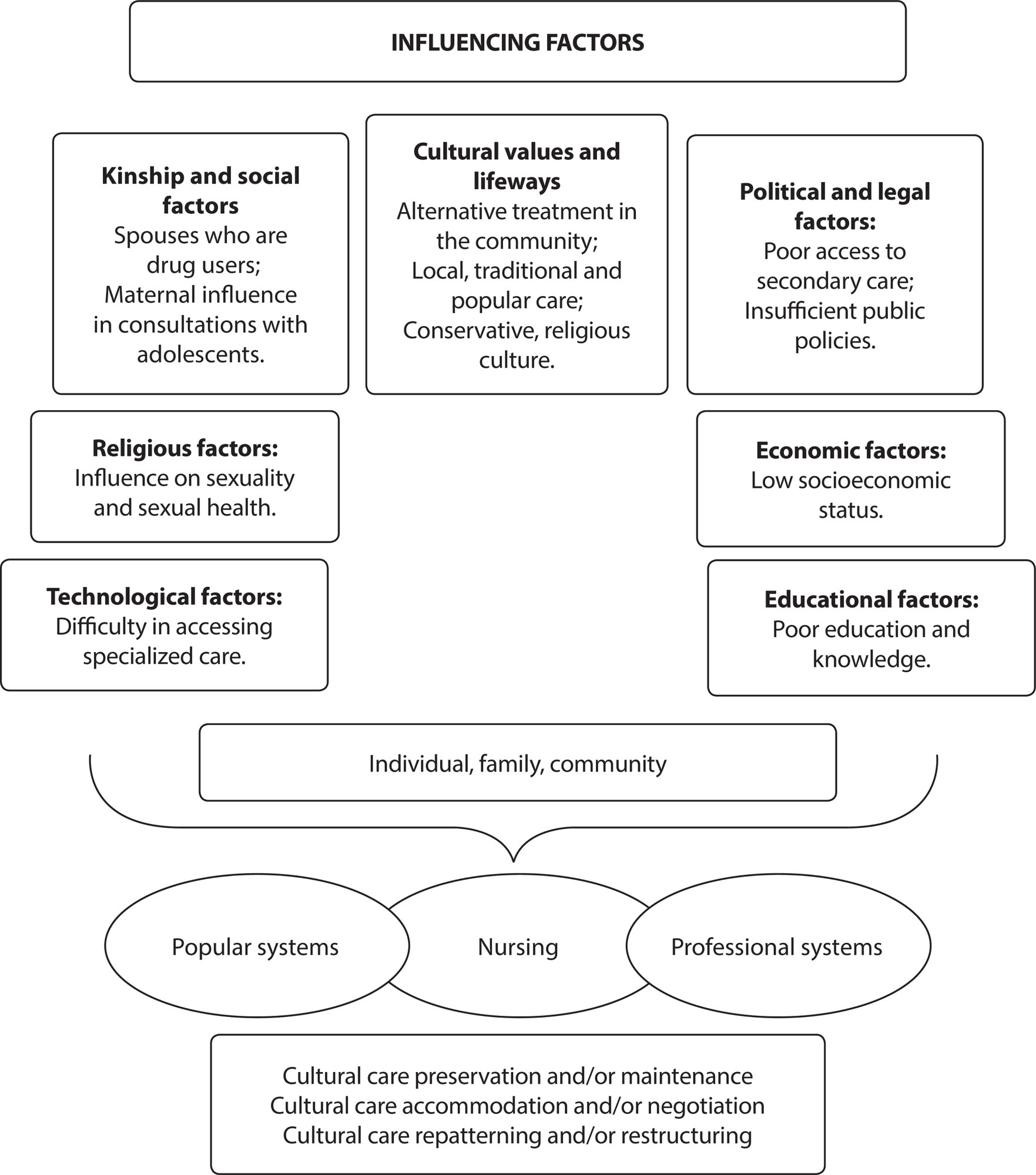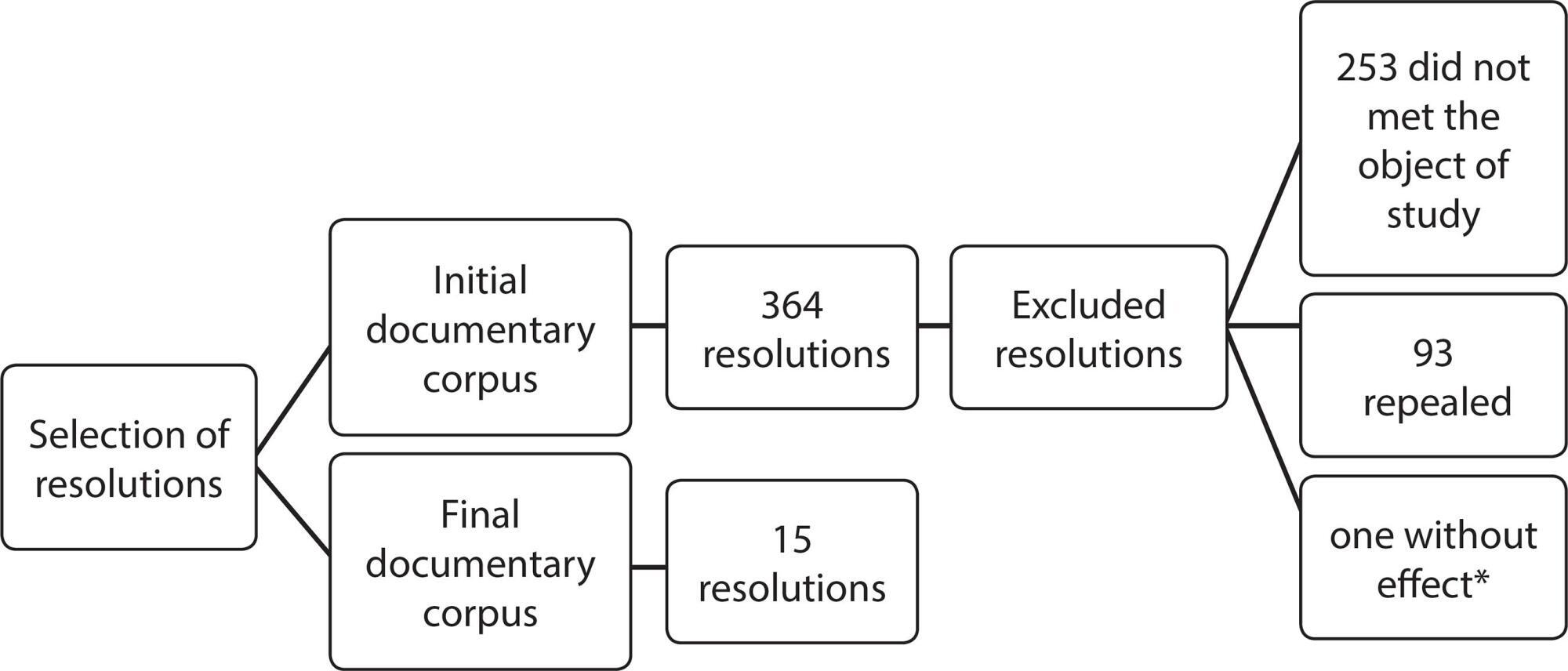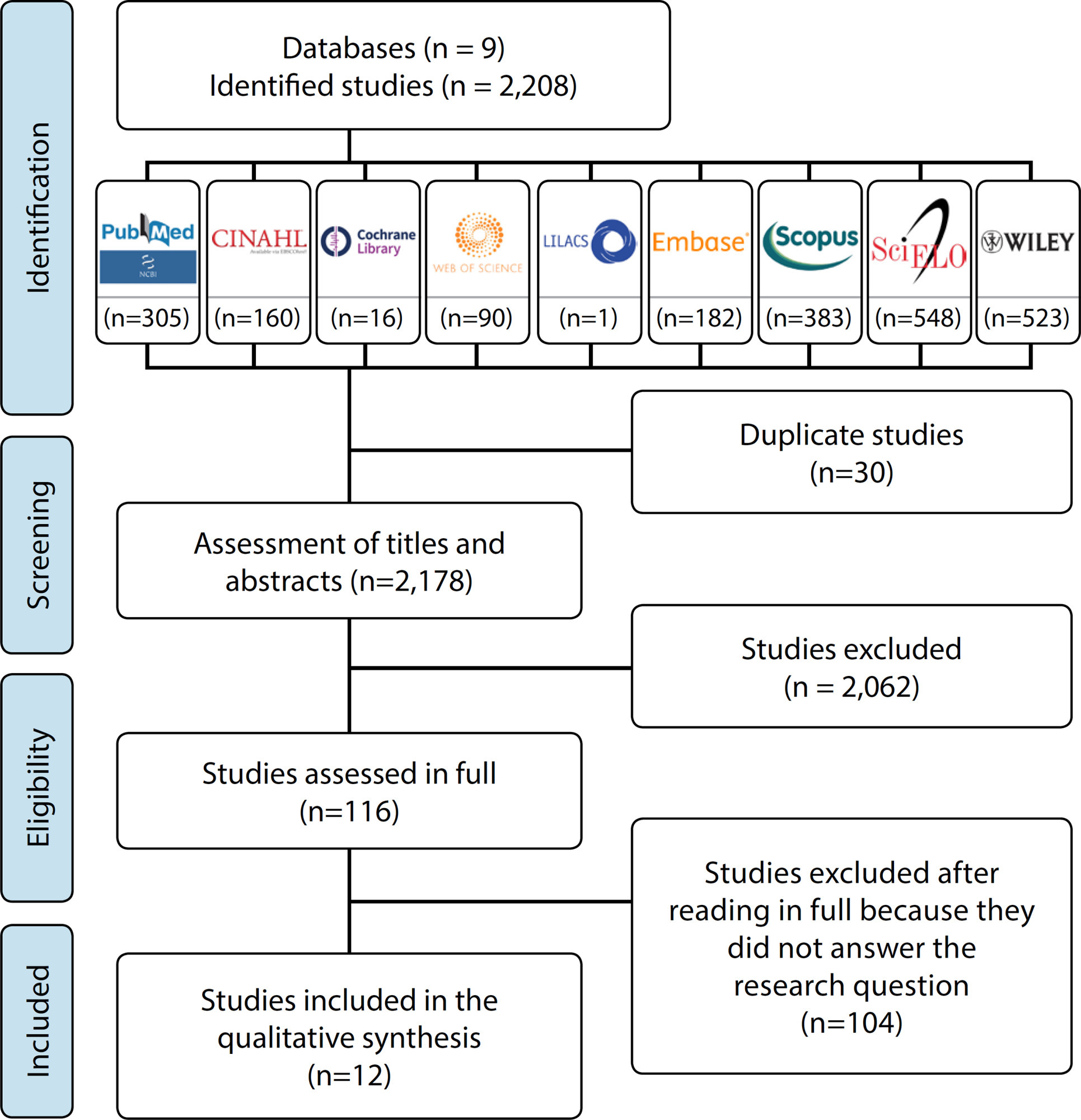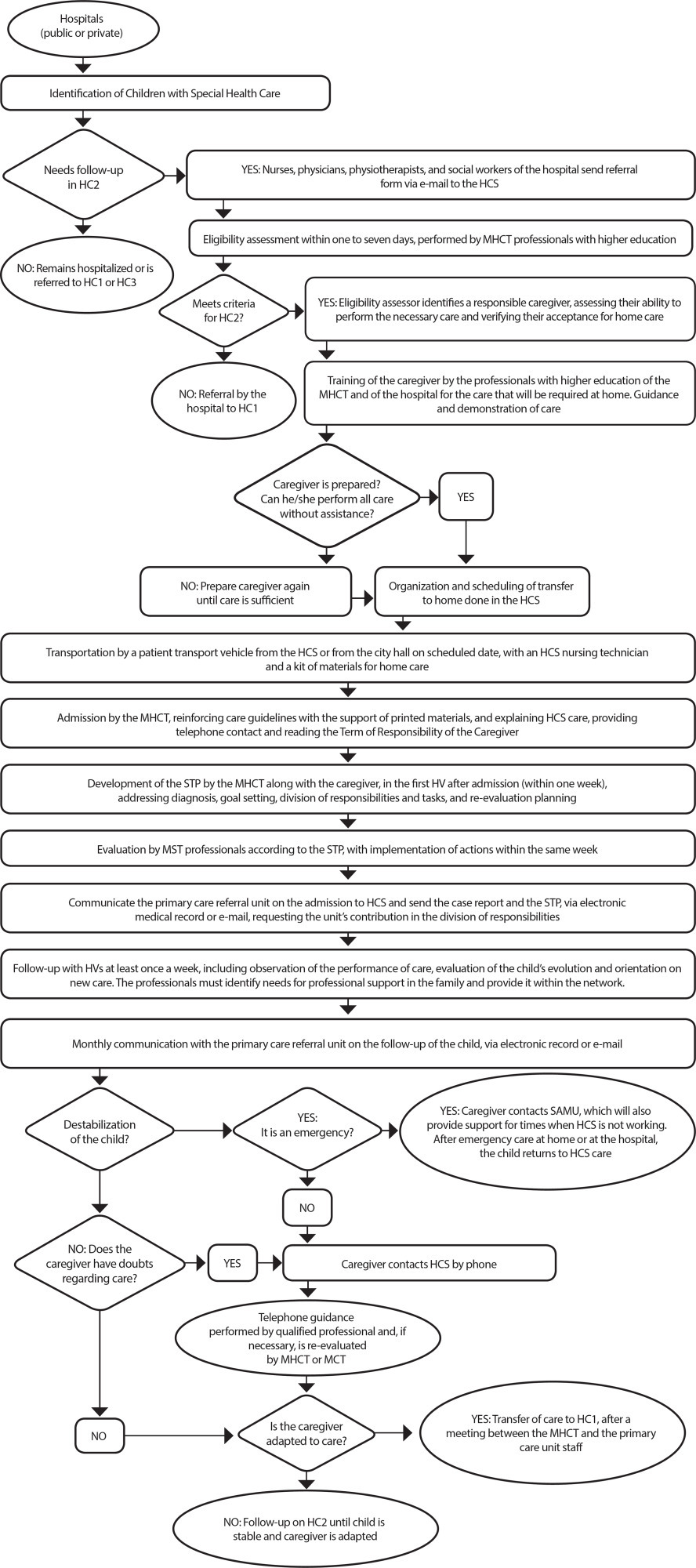-
ORIGINAL ARTICLE12-13-2024
Nurses’ experience regarding patient safety in mobile pre-hospital care
Revista Brasileira de Enfermagem. 2024;77(5):e20230529
Abstract
ORIGINAL ARTICLENurses’ experience regarding patient safety in mobile pre-hospital care
Revista Brasileira de Enfermagem. 2024;77(5):e20230529
DOI 10.1590/0034-7167-2023-0529
Views0See moreABSTRACT
Objectives:
to understand nurses’ experience regarding patient safety in mobile pre-hospital care.
Method:
a qualitative, exploratory and descriptive study, conducted with nurses active in mobile pre-hospital care services. Semi-structured interviews were conducted, audio-graved and submitted to Bardin’s content analysis.
Results:
from four thematic categories established, nurses reported the care and management skills necessary to work in this service. They demonstrated a commitment to ensuring safe care for patients, staff and spectators. They highlighted the actions taken to prevent and mitigate incidents. However, they based their experiences on practice protocols and individual actions, expressing the need to improve knowledge about patient safety.
Final Considerations:
mobile pre-hospital care nurses’ experience in relation to patient safety was limited, suggesting the need for training on the subject, alignment of work processes and implementation of strategies, aiming to guarantee safe care.
-
ORIGINAL ARTICLE12-13-2024
Stress in nursing workers caring for people with COVID-19
Revista Brasileira de Enfermagem. 2024;77(5):e20230542
Abstract
ORIGINAL ARTICLEStress in nursing workers caring for people with COVID-19
Revista Brasileira de Enfermagem. 2024;77(5):e20230542
DOI 10.1590/0034-7167-2023-0542
Views1See moreABSTRACT
Objectives:
to analyze stress from the perspective of nursing workers caring for people with COVID-19 in a public hospital in the Recôncavo region of Bahia.
Methods:
this is an exploratory qualitative study, conducted through semi-structured interviews. The data were analyzed using word clouds, similarity trees, and content analysis.
Results:
nursing workers were exposed to stress while attending to patients with COVID-19. The reported stressors in the workplace included: work overload, lack of planning, speed in performing tasks, fatigue, lack of participation in decision-making, lack of support from management, technological changes, excessive responsibility without preparation, interpersonal conflicts, and professional undervaluation.
Conclusions:
exposure to these stressors leads to emotional exhaustion and demotivation, which were intensified during the COVID-19 pandemic.

-
ORIGINAL ARTICLE12-13-2024
Knowledge and attitudes of nursing students regarding the sexuality of older adults: a quasi-experimental study
Revista Brasileira de Enfermagem. 2024;77(5):e20240011
Abstract
ORIGINAL ARTICLEKnowledge and attitudes of nursing students regarding the sexuality of older adults: a quasi-experimental study
Revista Brasileira de Enfermagem. 2024;77(5):e20240011
DOI 10.1590/0034-7167-2024-0011
Views0See moreABSTRACT
Objectives:
to compare the knowledge and attitudes of nursing students regarding sexual behavior and sexually transmitted infections (STIs) in older adults before and after an educational intervention.
Methods:
this quasi-experimental study involved a convenience sample of 45 nursing students from a public university, conducted in three stages: pre-intervention, intervention, and post-intervention. A questionnaire was used to assess sociodemographic characteristics, academic training, and knowledge and attitudes on the topic. The intervention was an educational web conference. Paired t-test and Wilcoxon test were used for data analysis.
Results:
there was a statistically significant difference in the knowledge and attitude scores of nursing students before and after the educational intervention (p < 0.001). A significant increase was observed in the knowledge score (from 9.3 to 12.2) and attitude score (from 108 to 117.2) in the post-intervention phase.
Conclusions:
the knowledge of nursing students regarding the sexuality of older adults increased after the educational intervention, and their attitudes on the subject became more positive.

-
ORIGINAL ARTICLE12-13-2024
Educational booklet on labor and delivery: validity study
Revista Brasileira de Enfermagem. 2024;77(5):e20240138
Abstract
ORIGINAL ARTICLEEducational booklet on labor and delivery: validity study
Revista Brasileira de Enfermagem. 2024;77(5):e20240138
DOI 10.1590/0034-7167-2024-0138
Views2See moreABSTRACT
Objectives:
to develop and validate an educational booklet on labor and delivery for pregnant women.
Methods:
this methodological study involved constructing and validating a booklet based on Echer’s framework. We used the Content Validity Index and Cronbach’s alpha for content and face validation, selecting judges according to Fering’s criteria. We then conducted a clinical validation with the target population.
Results:
the booklet, developed based on evidence from an integrative review and validated by judges and the target audience, achieved global Content Validity Index of 0.919 and 0.913, respectively. After clinical validation with 22 pregnant women, it included 28 topics and 48 pages, with illustrations by a graphic designer.
Conclusions:
expert judges and the target audience considered this educational technology valid, deeming it a relevant tool for promoting the health of pregnant women.

-
12-08-2024
Contexto ibero-americano da enfermagem: construindo e compartilhando conhecimento
Revista Brasileira de Enfermagem. 2024;77(1):e770101
Abstract
Contexto ibero-americano da enfermagem: construindo e compartilhando conhecimento
Revista Brasileira de Enfermagem. 2024;77(1):e770101
DOI 10.1590/0034-7167.2024770101pt
Views0Na próxima semana, acontecerão dois grandes eventos científicos em Madri e Granada (Espanha). Serão atividades internacionais, específicas e de forma muito especial, embora não exclusivas do campo ibero-americano, organizadas e desenvolvidas por duas sociedades científicas de enfermagem muito importantes, como a Associação de Enfermagem Comunitária (AEC) e a Associação Latino-Americana de Escolas e Faculdades de […]See more -
ORIGINAL ARTICLE12-08-2024
Initial nipple damages in breastfeeding women: analysis of photographic images and clinical associations
Revista Brasileira de Enfermagem. 2024;77(1):e20220773
Abstract
ORIGINAL ARTICLEInitial nipple damages in breastfeeding women: analysis of photographic images and clinical associations
Revista Brasileira de Enfermagem. 2024;77(1):e20220773
DOI 10.1590/0034-7167-2022-0773
Views0See moreABSTRACT
Objective:
to analyze the initial nipple damage degree by breastfeeding practice and to associate findings with clinical manifestations of breastfeeding women.
Methods:
a retrospective, cross-sectional study with primary data and photographic images database from two randomized clinical trials. Photographic images were analyzed by two independent evaluators using the Nipple Trauma Score. For analysis, the chi-square, Mann-Whitney tests and Kappa coefficient were applied.
Results:
115 breastfeeding women and their respective 186 photographic images were analyzed. The degree of agreement of evaluators using the Nipple Trauma Score was 93.6%. The nipple pain score during breastfeeding was moderate and compromised more than 25% of the nipple surface area.
Conclusions:
assistance to breastfeeding women should prioritize nipple pain intensity instead of the nipple damage size.

-
REVIEW12-08-2024
Interventions for Strengthening General Self-Efficacy Beliefs in College Students: An Integrative Review
Revista Brasileira de Enfermagem. 2024;77(1):e20230192
Abstract
REVIEWInterventions for Strengthening General Self-Efficacy Beliefs in College Students: An Integrative Review
Revista Brasileira de Enfermagem. 2024;77(1):e20230192
DOI 10.1590/0034-7167-2023-0192
Views0See moreABSTRACT
Objective:
To assess the evidence regarding the effectiveness of interventions aimed at strengthening self-efficacy beliefs in college students.
Methods:
Integrative Review conducted on the Lilacs, PubMed, CinahL, Cochrane Collaboration Databases, Scopus, and PsycInfo databases. The methodological quality of the studies was assessed using tools proposed by the Joanna Briggs Institute, and the results were analyzed descriptively.
Results:
Out of the 10 selected studies, six demonstrated that interventions aimed at strengthening self-efficacy were effective (Levels of Evidence II and III), and four revealed contrary results (Levels of Evidence I and II). Programs aimed at enhancing self-efficacy should include content on positive mental health, psychoeducation strategies, cover a period of eight to twelve weeks, and consider the completion of homework assignments.
Conclusion:
The synthesis of evidence pointed to pathways for building an effective self-efficacy strengthening program to be implemented in universities.

-
REVIEW12-08-2024
Common mental disorders in hematopoietic stem cell transplant patients: a scoping review
Revista Brasileira de Enfermagem. 2024;77(1):e20220581
Abstract
REVIEWCommon mental disorders in hematopoietic stem cell transplant patients: a scoping review
Revista Brasileira de Enfermagem. 2024;77(1):e20220581
DOI 10.1590/0034-7167-2022-0581
Views0See moreABSTRACT
Objective:
to map common recurrent mental disorders in patients undergoing hematopoietic stem cell transplantation.
Methods:
this is a scoping review carried out in January 2022 in electronic databases and repositories of dissertations and thesis. Studies that answered the research question, met the objective of the study and were available in full electronically, in any language, were included.
Results:
the sample consisted of 28 studies, 14 of which were published in the United States of America. The common mental disorders found were depressive, anxiety, post-traumatic stress and mood disorders. Twenty symptoms were mentioned, among the most prevalent are fatigue and sleep disorders/insomnia.
Conclusions:
the difficulty and importance of carrying out the differential diagnosis of these disorders were highlighted, since their symptoms can be confused with other health problems and have a strong potential to interfere with patients’ evolution.

-
ORIGINAL ARTICLE09-21-2020
Transcultural theory in nursing care of women with infections
Revista Brasileira de Enfermagem. 2020;73:e20190586
Abstract
ORIGINAL ARTICLETranscultural theory in nursing care of women with infections
Revista Brasileira de Enfermagem. 2020;73:e20190586
DOI 10.1590/0034-7167-2019-0586
Views0See moreABSTRACT
Objective:
To analyze how nurses consider, in their practice of healthcare, the sociocultural context of women with sexually transmitted infections.
Method:
Qualitative research, carried out in October 2017, with ten nurses working in teams of the Estratégia de Saúde da Família (Family Health Strategy). The data were collected through semi-structured interviews, subsequently transcribed, and submitted to the organization supported by the Discourse of the Collective Subject method and analyzed according to Madeleine Leininger’s transcultural theory.
Results:
Nurses identified the sociocultural aspects of women with sexually transmitted infections and recognized the presence of influencing factors: technological, religious, economic, political, and legal, kinship and social, cultural values, and lifeways.
Final Considerations:
The study found that the provision of care by nurses in Primary Health Care is close to the sociocultural aspects of these women when considering the beliefs and values of each individual, especially regarding the life context and their care experiences.

-
ORIGINAL ARTICLE11-15-2022
Reasons assigned to suicide attempts: adolescents’ perceptions
Revista Brasileira de Enfermagem. 2022;75:e20210163
Abstract
ORIGINAL ARTICLEReasons assigned to suicide attempts: adolescents’ perceptions
Revista Brasileira de Enfermagem. 2022;75:e20210163
DOI 10.1590/0034-7167-2021-0163
Views0See moreABSTRACT
Objective:
identify the reasons for attempting suicide from the perspective of adolescents.
Methods:
qualitative study conducted with ten adolescents who attempted suicide and were attending a Centro de Atenção Psicossocial Infanto-Juvenil located in a city in the south of Brazil. Semi-structured interviews were held in July 2020 using WhatsApp. Data were analyzed according to Minayo’s Content Thematic Analysis.
Results:
the adolescents’ reports listed the reasons that triggered suicide attempts, such as changes in the adolescents’ life cycle and violence, which led them to attempt suicide to solve problems.
Final considerations:
Data analysis revealed the reasons that triggered suicide attempts from the adolescents’ perspective and difficulties to cope with problems, probably explained by their lack of experience in dealing with frustrations and disappointments.
-
REFLECTION06-04-2021
Care in pediatric nursing from the perspective of emotions: from Nightingale to the present
Revista Brasileira de Enfermagem. 2021;74(4):e20200377
Abstract
REFLECTIONCare in pediatric nursing from the perspective of emotions: from Nightingale to the present
Revista Brasileira de Enfermagem. 2021;74(4):e20200377
DOI 10.1590/0034-7167-2020-0377
Views0See moreABSTRACT
Objective:
Reflect on the evolution of pediatric nursing care from the perspective of emotions, from the conceptions of Florence Nightingale to the present.
Method:
Reflective study based on theoretical and experiential aspects of emotional care in pediatric nursing.
Results:
From Nightingale, there were many definitions regarding the nursing care in an integrative and humanist logic; and with certain bond to emotional dimension. That time, nursing care was based on the religious conceptions of charity and love of our neighbor and, despite the conceptualization that shapes nursing science today, such conceptions have not ceased to be its attribute, mainly in the care of pediatric nurses.
Final considerations:
In pediatric nursing, nurture care with affection and facilitate emotions management in each interaction nurse-child-family is crucial for caring. This emotional care should evolve into a competence that recognizes the expertise and merit of professional action.
-
ORIGINAL ARTICLE04-03-2020
Analysis of the guiding rules of the nurse technician’s practice in Brazil
Revista Brasileira de Enfermagem. 2020;73(3):e20180322
Abstract
ORIGINAL ARTICLEAnalysis of the guiding rules of the nurse technician’s practice in Brazil
Revista Brasileira de Enfermagem. 2020;73(3):e20180322
DOI 10.1590/0034-7167-2018-0322
Views0INTRODUCTIONThe institutionalization of nursing as a profession is characterized by the division of labor, marked by discipline and hierarchy, with the participation of several active agents, among which we can cite the nurse, the nurse technician, the nursing assistant, and the nursing attendant. The latter, although mentioned in the legislation, has been extinct since the […]See more
-
REVIEW09-06-2022
Biosafety measures to prevent COVID-19 in healthcare professionals: an integrative review
Revista Brasileira de Enfermagem. 2022;75(1):e20201191
Abstract
REVIEWBiosafety measures to prevent COVID-19 in healthcare professionals: an integrative review
Revista Brasileira de Enfermagem. 2022;75(1):e20201191
DOI 10.1590/0034-7167-2020-1191
Views0See moreABSTRACT
Objective:
to identify the main biosafety measures for preventing COVID-19 in healthcare professionals.
Methods:
this is an integrative literature review, with studies published between January and July 2020, on the MEDLINE/PubMed, Scopus, Embase, Web of Science, LILACS, SciELo, Wiley Online Library, Cochrane CINAHL databases. The selection of studies followed the PRISMA recommendations.
Results:
among the 2,208 publications identified, 12 studies comprised the sample, which enabled the analysis in four thematic categories: The importance of using recommendations about the use of personal protective equipment; The restructuring of new operational and clinical routines and flows in the practice of services; Monitoring professionals, especially testing; Conducting training.
Conclusions:
the phenomena involved are innumerable, covering operational management and the training of teams to deal with highly infectious pathogens and disease outbreaks.

-
ORIGINAL ARTICLE09-21-2020
Organizational flow chart of home care for children with special health care needs
Revista Brasileira de Enfermagem. 2020;73:e20190310
Abstract
ORIGINAL ARTICLEOrganizational flow chart of home care for children with special health care needs
Revista Brasileira de Enfermagem. 2020;73:e20190310
DOI 10.1590/0034-7167-2019-0310
Views0See moreABSTRACT
Objective:
To develop a workflow protocol for Home Care (HC) services in the HC2 modality for children with special health care needs (CSHCN) in the state of Parana.
Method:
Quantitative, descriptive, exploratory, multiple case studies. Data was collected with professionals from the eight home care services in Parana. Data were analyzed using the Strengths, Weaknesses, Opportunities and Threats (SWOT) methodology, from which a 5W2H method of action plan was developed, resulting in a flow chart.
Results:
Considering the strategies found in Home Care services, such as planned hospital discharge, caregiver training, organized transportation and singular therapeutic project, a flow organization protocol for children with special health care needs in Home Care services was developed.
Conclusion:
The protocol developed makes it possible to organize the care provided to children with special health care needs in home care.

-
ORIGINAL ARTICLE02-10-2020
Relationship between quality of life, self-esteem and depression in people after kidney transplantation
Revista Brasileira de Enfermagem. 2020;73(1):e20180245
Abstract
ORIGINAL ARTICLERelationship between quality of life, self-esteem and depression in people after kidney transplantation
Revista Brasileira de Enfermagem. 2020;73(1):e20180245
DOI 10.1590/0034-7167-2018-0245
Views0See moreABSTRACT
Objective:
to assess the relationship between health-related quality of life with depression and self-esteem of people after kidney transplantation.
Method:
a cross-sectional study of 47 outpatients from October 2016 to February 2017. The following tools were applied: The Medical Outcomes Study 36-Item Short-Form Health Survey, Beck Depression Inventory and Rosenberg Self-Esteem Scale. Descriptive statistics and Spearman correlation were used.
Results:
women had lower scores for health-related quality of life. Young adults, people with up to one and a half years of transplantation and those who had dialysis for more than one year had higher scores.
Conclusion:
the health-related quality of life of people with chronic kidney disease after transplantation ranged from good to excellent. The presence of depression was not identified. The relationship of data indicates that the higher the quality of life, the better the self-esteem assessment.
-
03-19-2021
Life satisfaction and health self-assessment of older adults assisted through home care
Revista Brasileira de Enfermagem. 2021;74:e20200357
Abstract
Life satisfaction and health self-assessment of older adults assisted through home care
Revista Brasileira de Enfermagem. 2021;74:e20200357
DOI 10.1590/0034-7167-2020-0357
Views0See moreABSTRACT
Objective:
to identify sociodemographic and health characteristics according to age groups and to analyze the association between self-assessed health status and satisfaction with regular/bad life with sociodemographic characteristics, global functioning and falls of older adults linked to home care within the primary health care network.
Method:
cross-sectional study with 124 older adults, conducted using home interviews. A sociodemographic data and health status questionnaire was used, together with Barthel Index, Lawton Instrumental Activities of Daily Living Scale (IADL), the Mini-Mental State Examination, the Geriatric Depression Scale and the Timed Up and Go Test. Bivariate and multivariate analyses (Poisson regression) were applied.
Results:
there was a predominance of female octogenarians. Self-assessment of regular/bad health was associated with mild (p=0.002) and severe (p<0.001) depressive symptoms. Satisfaction with regular/bad life was associated with fear of falling (p=0.019) and with mild (p<0.001) and severe (p<0.001) depressive symptoms.
Conclusion:
depressive symptoms were associated with a worse life satisfaction and health self-assessment.

Search
Search in:
Nuvem de Tags
Adolescente (85) Atenção Primária à Saúde (239) COVID-19 (91) Criança (91) Cuidados de Enfermagem (269) Educação em Enfermagem (151) Educação em Saúde (139) Enfermagem (930) Enfermagem Pediátrica (86) Estudantes de Enfermagem (77) Estudos de Validação (131) Família (87) Idoso (208) Promoção da Saúde (99) Qualidade de Vida (104) Saúde do Trabalhador (86) Saúde Mental (145) Saúde Pública (82) Segurança do Paciente (150) Tecnologia Educacional (100)



